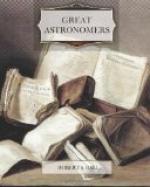The King took so great a fancy to the astronomer that he first, as I have already mentioned, duly pardoned his desertion from the army, some twenty-five years previously. As a further mark of his favour the King proposed to confer on Herschel the title of his Majesty’s own astronomer, to assign to him a residence near Windsor, to provide him with a salary, and to furnish such funds as might be required for the erection of great telescopes, and for the conduct of that mighty scheme of celestial observation on which Herschel was so eager to enter. Herschel’s capacity for work would have been much impaired if he had been deprived of the aid of his admirable sister, and to her, therefore, the King also assigned a salary, and she was installed as Herschel’s assistant in his new post.
With his usually impulsive determination, Herschel immediately cut himself free from all his musical avocations at Bath, and at once entered on the task of making and erecting the great telescopes at Windsor. There, for more than thirty years, he and his faithful sister prosecuted with unremitting ardour their nightly scrutiny of the sky. Paper after paper was sent to the Royal Society, describing the hundreds, indeed the thousands, of objects such as double stars; nebulae and clusters, which were first revealed to human gaze during those midnight vigils. To the end of his life he still continued at every possible opportunity to devote himself to that beloved pursuit in which he had such unparalleled success. No single discovery of Herschel’s later years was, however, of the same momentous description as that which first brought him to fame.
[Plate: The 40-foot telescope as it was in the year 1863, Herschel house, Slough.]
Herschel married when considerably advanced in life and he lived to enjoy the indescribable pleasure of finding that his only son, afterwards Sir John Herschel, was treading worthily in his footsteps, and attaining renown as an astronomical observer, second only to that of his father. The elder Herschel died in 1822, and his illustrious sister Caroline then returned to Hanover, where she lived for many years to receive the respect and attention which were so justly hers. She died at a very advanced age in 1848.
LAPLACE.
The author of the “Mecanique Celeste” was born at Beaumont-en-Auge, near Honfleur, in 1749, just thirteen years later than his renowned friend Lagrange. His father was a farmer, but appears to have been in a position to provide a good education for a son who seemed promising. Considering the unorthodoxy in religious matters which is generally said to have characterized Laplace in later years, it is interesting to note that when he was a boy the subject which first claimed his attention was theology. He was, however, soon introduced to the study of mathematics, in which he presently became so proficient, that while he was still no more than eighteen years old, he obtained employment as a mathematical teacher in his native town.




